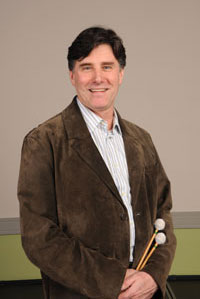"I want to make my students so comfortable with what they can do that it becomes very easy for them to make music—to really enjoy what they're doing and not feel compromised. When I have something really hard to do, if I can make it enjoyable, it's not hard anymore. But it takes a lot of hours of practice to get there. The minute you don't have a sense of what you're doing, then there's always the nervousness and discomfort of whether you're going to get it or not."
"The first thing I ask everybody in the Snare for Drum Set course is what their issues are. As we go around the room, I hear people say they don't like their roll, their grip, their stroke, their sound. So we spend 14 weeks breaking that down. I push my students especially hard not to have lazy grips. My goal is for them to see marked improvement in the way they play—their sound, their tone, their time—as a result of working on their grip and their stroke. I can see in their faces that they're almost amazed at the change, and they say their enjoyment in what they're doing has leaped."
"Stroke is the one thing, once I figured it out, that made my playing go to where it needed to for my career. I want my students to learn how to have a really good sound when they hit their instrument, no matter which instrument it is. And it's how you're holding your stick or mallet that will give you the most efficient use of that stroke. The sound will get better, and you'll also come away with a much better sense of time."
"I work with my students to think musically, not just think about playing the exact notes or the exact time. Whatever you're laying down as the primary timekeeper, to make the time and the musical sense correct, it needs to have a musical purpose. When I teach a student to play a Bach piano piece on a marimba, for example, I first get them through the notes—to know how to read the music and use their hands mechanically. Then I ask them to play it musically—to make it breathe so it's not just notes and mechanics. I want my students to be aware of their dynamics, their musical presence, and the texture of what's going on around them."

